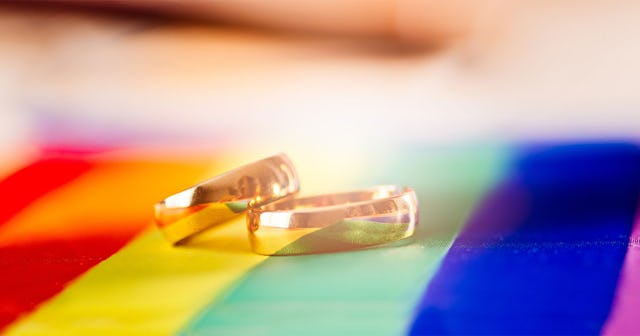Why Using The Term 'Wife' To Refer To My Spouse Is A Big Deal For Me

My wife lectured me when she came to my office once: “Why don’t you have a picture of us up on your desk?” I looked at her and then back at my desk. The only photo I had on my desk was of our three kids. There was no photo of her to be found. She went on, “Why don’t you have a photo of me up? I have one of you on my desk.” She was right; I didn’t have a photo of her up, not because I didn’t love her or like to talk about her, but it was my office and I didn’t want to answer other people’s questions about my relationship, my marriage.
I realized once we had that conversation that it was important, necessary even, for me to put up a photo and field all of the questions that might come my way, convenient or not. It’s something we do in every social situation, something we do on every health related form or document related to our kids — we come out, again and again. We have to reveal ourselves as a same-sex couple, calling one another what we are to each other: wife.
In 2015 when same-sex marriage was legalized in the United States, my wife and I had been living as a married couple in what at the time was recognized as a civil union. Gary Gates, a demographer who specializes in LGBTQ issues, told ABC News, “Opponents of marriage equality frequently argued that same-sex couples really weren’t all that interested in marriage. But the large increase in marriages among same-sex couples since marriage equality became legal nationwide offers evidence of the clear desire for marriage among same-sex couples.”
Indeed, the opponents were clearly wrong, and my wife and I proved this point when we said “I do” in front of our family and friends. We wanted to be married, just like any couple — and to have the same benefits allowed for our straight friends and family, like referring to one another as “wife.”
As queer people, we know what it’s like to come out. We have our own coming out stories from when we were teenagers, or a new college student, or maybe as an older person. There are times when we must retell those stories, perhaps in an effort to help a young person who is coming out or to remind ourselves of how far we’ve come in our lives.
When I got married in 2011, I was very happy and we were lucky to have our marriage recognized not only in the eyes of the law but by others too. Our union is like every other couple, gay or straight: we argue, we bicker, we love, we pay our bills, and as parents we worry about our kids. We are a couple, and I’d grown into the ease of calling her my “partner” through it all — and she is, but that word is ambiguous.
She is my wife. I need to call her my wife. Partner, I think, implies that she does not mean as much to me as she does. When I say partner, it’s the safety word I used to use in public, in social situations I was unsure of. There are times, as queer people, we need to choose our words carefully in order to keep our bodies and mental and emotional health safe. I get that. I’ve been there.
Over 1 million households across the United States identify as same-sex couples. In 2019, 58% of the 980.000 same-sex couples in the United States identified were married, according to the the Census Bureau’s report. When we look into the lives of others and attempt to understand who they are and how they identify, we are working to build a bridge that we possibly didn’t even know needed to be built. And we, as queer people, have a say in how that bridge gets built.
How I refer to my wife in public matters — just like it matters when others hear me call her “Babe,” too; it signifies that she means something to me. Though it’s a term of endearment that we often hear come so easily out of the mouths of others, for me — and many other gay people — we hesitate a bit when it’s time to say “wife.”
When I refer to my wife as my wife in public, there is no gray area when the person hearing me wants to know who she is. We are one of millions, my wife and I, because in the United States 11.3 million people identify as gay, lesbian, or transgender. Socially, we live in a constant state of coming out, in an effort to help educate others. And that is okay, if it means people will understand that our union is just as important, and as loving, as every other.
This article was originally published on